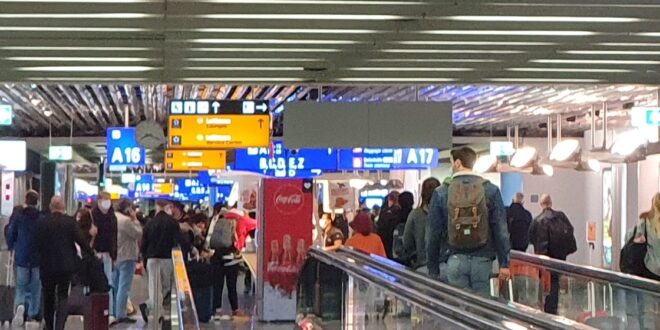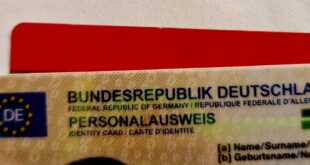Almost every new month of the year brings new laws and regulations that affect various areas of everyday life. In May 2024, people living in Germany can once again expect important changes: higher minimum wages in elderly care, flights from Germany will become more expensive, new field added on identity cards etc. Here’s an overview of these and other new laws and regulations in May
Minimum wage in geriatric care increases
From May, unskilled care workers will receive at least 15.50 euros per hour (currently they earn 14.15 euros). The minimum wage will rise to 16.50 euros per hour (currently 15.25 euros) for qualified care assistants and 19.50 euros per hour (currently 18.25 euros) for skilled carers. A further increase in the minimum wage in geriatric care is planned for 1 July 2025. It will be staggered according to qualification levels and, like the first increase in May, will apply uniformly throughout Germany.
More money for workers in the metal and electrical industry
Employees and trainees in the metal and electrical industry will receive more money from 1 May 2024. Pay and training allowances will increase by 3.3 per cent. The pay agreements can be terminated for the first time on 30 September 2024, according to IG Metall, the union that represents workers in the sector, which will then be able to negotiate further pay rises.
Hospital atlas goes live
The so-called hospital atlas (Krankenhaus-Atlas) will be available from 1 May. Patients will then be able to see online which hospitals specialise in which fields. This will allow them to assess which hospital has the most experience in the area they are interested in before undergoing an operation. The hospital atlas is to be presented to the public on 16 May, according to a spokesperson for the Federal Ministry of Health.
Flights from Germany will become more expensive
The ticket tax for airlines is to increase by 20 per cent from 1 May. This tax increase can be passed on to passengers by the airlines and affects all passengers taking off from German airports. This means that anyone booking a flight from May onwards will pay more and the amount varies depending on the distance. For flights within Europe that fall into distance class I, this means an increase in tax from 12.73 euros to 15.53 euros. For medium-haul flights (distance class II), for example to North Africa or the Middle East, the tax increases from 32.25 euros to 38.72 euros. For long-haul flights (distance class III), for example to Sub-Sahara Africa, North and South America, the tax increases from 58.06 euros to 70.83 euros. The higher ticket tax is intended to help close the federal budget gap.
End of the railway app
Deutsche Bahn’s smartphone app DB Streckenagent will be discontinued on 2 May. Passengers could use the service to be alerted about current disruptions, for example. In future, some of the DB Streckenagent functions will be added to the DB Navigator app, which you can use to search for connections, book tickets and receive real-time information for regional, local and long-distance transport. If you have purchased a Deutschlandticket via the DB Streckenagent, this subscription will be automatically cancelled on 30 April 2024, as Deutsche Bahn states that it cannot be transferred to another app for technical reasons. You can then take out a new subscription with the DB Navigator.
New field on identity cards and passports
Another change in May affects the identity cards and passports of all citizens in Germany who have a doctorate. Specifically, the academic degree will now have its own field on the ID card and passport. This is because the use of the abbreviation “Dr” often causes confusion abroad and delays at border controls, as the abbreviation “Dr” has in some cases been interpreted as part of the surname. However, affected citizens do not have to do anything about this. When renewing their ID card after 1 May, the new layout will be implemented automatically. Old ID cards will remain valid.
AI warnings on Facebook and Instagram
Meta wants to label more AI-generated content with the words “Made with AI” instead of deleting it from the platforms. The company wants to counteract false reports without restricting users’ freedom of expression by deleting content. Meta plans to start labelling in May, with the deletion of content to be stopped in July.
Labelling of new cars becomes mandatory
From 1 May, anyone buying a new car will receive more information from the dealer. Specific fuel consumption and emissions data will be mandatory. The methodology for the CO2 colour scale is also changing: As before, a car will be categorised from A (green) to G (red), but weight will no longer play a role. The possible CO2 costs over ten years must also be shown. Another significant change will also affect motorists, who from May will be able to fill up their tanks with biodiesel produced entirely from waste materials such as used cooking fat. This option was previously only available as an additive to conventional diesel. The new regulation is expected to come into effect in May, but a specific date has yet to be set.
Public Holidays in May
May is a month full of public holidays. It starts with Labour Day on 1 May 2024 (Wednesday). This is followed by Ascension Day on 9 May 2024, the second public holiday of the month (Thursday). Whit Monday falls on 20 May 2024 this year, while Corpus Christi (30 May 2024) is a public holiday celebrated in Baden-Württemberg, Bavaria, Hamburg, North Rhine-Westphalia, Rhineland-Palatinate and Saarland.
Paying parking tickets from Switzerland in Germany
Anyone who drives too fast or parks incorrectly in Switzerland has so far been able to sit out the sometimes high fines. Not anymore. From 1 May, German parking offenders or speeders who receive a ticket in Switzerland will be asked to pay the fine in Germany. This is made possible by a new agreement between the two countries. Conversely, Swiss traffic offenders can also be prosecuted more easily. The new regulation applies if the fine exceeds a total of 70 euros or 80 francs. In Switzerland, this threshold is quickly reached: anyone who overspeeds by 20 kilometres per hour must pay at least 180 euros fine. In Germany it would only be 60 euros.
Femi Awoniyi
READ ALSO New Laws and Regulations in Germany from April 2024
 THE AFRICAN COURIER. Reporting Africa and its Diaspora! The African Courier is an international magazine published in Germany to report on Africa and the Diaspora African experience. The first issue of the bimonthly magazine appeared on the newsstands on 15 February 1998. The African Courier is a communication forum for European-African political, economic and cultural exchanges, and a voice for Africa in Europe.
THE AFRICAN COURIER. Reporting Africa and its Diaspora! The African Courier is an international magazine published in Germany to report on Africa and the Diaspora African experience. The first issue of the bimonthly magazine appeared on the newsstands on 15 February 1998. The African Courier is a communication forum for European-African political, economic and cultural exchanges, and a voice for Africa in Europe.
































